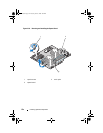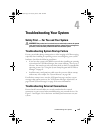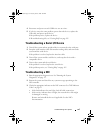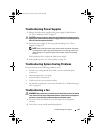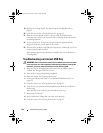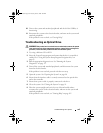
158 Troubleshooting Your System
• Change the auto negotiation setting, if possible.
• Use another connector on the switch or hub.
If you are using a NIC card instead of an integrated NIC, see the
documentation for the NIC card.
4
Ensure that the appropriate drivers are installed and the protocols are
bound. See the NIC's documentation.
5
Enter the System Setup program and confirm that the NIC ports are
enabled. See "Integrated Devices Screen" on page 69.
6
Ensure that the NICs, hubs, and switches on the network are all set
to the same data transmission speed. See the documentation for each
network device.
7
Ensure that all network cables are of the proper type and do not exceed the
maximum length.
If all troubleshooting fails, see "Getting Help" on page 185.
Troubleshooting a Wet System
WARNING: Only trained service technicians are authorized to remove the system
cover and access any of the components inside the system. Before you begin this
procedure, review the safety instructions that came with the system.
1
Turn off the system and attached peripherals, and disconnect the system
from the electrical outlet.
2
Open the system. See "Opening the System" on page 90.
3
Remove the following components from the system. See "Installing
System Components" on page 83.
• Cooling shroud
• Hard drives
• SD cards
• USB memory keys
• NIC hardware key
• Internal SD module
• Expansion cards
• iDRAC6 Enterprise card
book.book Page 158 Tuesday, June 9, 2009 4:09 PM



